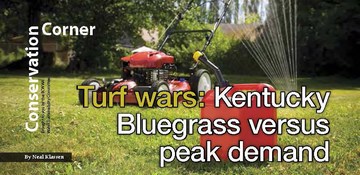Conservation Corner: Turf Wars – Kentucky Bluegrass versus peak demand

This year, I ripped out my lawn and installed Synlawn. It is synthetic grass that looks like the real thing, but I do not have to water it, fertilize it, or mow it. Finally, I have the greenest lawn on the block.
The impact of real turf grass on Kelowna’s water utility is significant. In 2008, peak day demand was 90,763 m3, while the average winter demand was around 30,000 m3. We estimate that close to 60,000 m3 – about 66% – of the water we pump in the summer months goes on the grass. (There is no agriculture or golf course connected to the city system). However, because peak demand is created by residential, multi-family, and the ICI sector, this is just a rough estimate.
Then we looked at data from residential water meters and found that water use in the winter months averaged 211 liters per capita, per day (lpcpd) in 2008; in July, it was 919 lpcpd. If we assume the difference between the two numbers is due to irrigation, 708 lpcpd – or 77% of the water used by residents in the summer months ends up on the lawn.
From a water supply perspective, Kentucky Bluegrass is not our friend. But people love it, and it is easy to see why. It is easy to plant and it grows fast. It cools the surrounding environment, and it provides areas for children to play. According to a newsletter from a local lawn care company, turf grass is a “terrific ground cover with no equal.”
While it is natural for a lawn care company to promote lawns, some of its claims about the benefits of turf grass are a bit shaky. Among those claims:
- Turf grass traps and removes pollution like carbon dioxide.
Comment: Turf grass also adds carbon dioxide to the atmosphere via gaspowered lawnmowers. The US EPA estimates that gas-powered mowers may contribute up to 5% of the nation’s air pollution. - Turf grass acts like an organic filter, allowing ground water to recharge naturally.
Comment: Turf grass also contributes to urban runoff via inefficient irrigation systems. Drive through a Kelowna neighbourhood on a summer morning and you will see irrigation water streaming down the road, carrying fertilizer and pesticides into the storm sewer. - Turf grass improves water quality.
Comment: Turf grass also degrades water quality. See comment in point 2. - Turf grass decreases noxious pests and disease.
Comment: Turf grass, or any form of monoculture, increases the potential for noxious pests and disease, resulting in increased pesticide use. - Turf grass improves soil health.
Comment: Many lawn care products, particularly high-nitrogen fertilizers, degrade soil health and excessive irrigation increases soil salinity.
For every argument the lawn-care industry makes about the benefits of turf grass, there is a counter argument. And we have not even considered the grass clippings filling our landfills and generating greenhouse gases as they decompose.
The problem is there are few viable alternatives to turf grass in suburban neighborhoods. In Kelowna, we have had mixed results experimenting with drought tolerant grasses and ground covers like woolly thyme. For all but a handful of dedicated gardeners, the word ‘xeriscape’ conjures up images of rocks and boring, brown plants. And not everyone is willing to put in a synthetic lawn like I did.
The solution, I believe, is more imaginative landscapes. Yes, we should have turf grass, just less of it. There is a place for rocks and mulch, but a landscape with nothing but rocks and mulch looks more like a moonscape. And partial xeriscaping, in a landscape that includes turf grass, rocks and mulch, is a great idea if the public can get beyond the perception that xeriscape means ‘zero-scape.’
As for me, I will spend my summers relaxing on my Synlawn, watching my neighbors water and mow, water and mow, water and mow….
By Neal Klassen, BCWWA “Watermark” contributor
Originally published in the Summer 2009 issue of Watermark Magazine, the official publication of the British Columbia Water & Waste Association (BCWWA).
Posted July 2009

